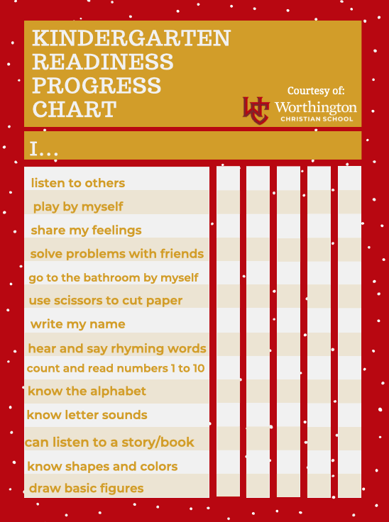This is a question that crops up in the minds of preschool parents each spring as the next school year is on the horizon. A child’s age is often the initial consideration for kindergarten enrollment (the state of Ohio mandates that a child must be enrolled in school by the age of 6), but there are so many factors to consider as we as parents and educators try to determine true readiness.
While school success is most often associated with academic learning, being ready for Kindergarten is much more than knowing numbers and letters. In addition to basic academic skills, future Kindergarteners need certain social, emotional, and physical skills to ensure that they will make a smooth transition into formal schooling. From my experience in assessing student readiness and collaborating with seasoned Kindergarten-teaching colleagues, here are some skills to consider as you think about your child's progress:
Social Skills
As we think about formal schooling (preschool and Kindergarten) for our littles, we likely think first of the ABC's and 123's, the art activities that teach colors and shapes, name-writing practice--basic building blocks of an education. But one thing that may be easily overlooked at this age is the development of social skills. Social skills for Kindergarten readiness include:
- Tolerates separation from parents/primary caregivers
- Plays well independently and in a group
- Shares, takes turns
- Engages in conversations, listens and follows directions
- Follows the rules of conversation
- Can concentrate on a specific task for at least five minutes
Emotional Skills
Preschool is a time when kids begin to learn the language skills needed to express their emotions. Talking about emotions and providing language for preschoolers to talk about emotions move them toward being able to identify and express feelings in themselves. Their better understanding of emotions will help them socially as they develop relationships and help them more appropriately cope with social situations. Emotional skills for Kindergarten readiness include:
- Understands and can articulate basic feelings
- Demonstrates self-control with peers
- Solves problems with increasing independence
- Negotiates solutions to conflict with peers
Ideas for encouraging social and emotional skills: Awana, Vacation Bible School, summer camp, Sunday school, preschool experience, games that encourage turn-taking and patience, multi-step projects, legos, chores
Physical Skills
Physical skills can be divided into gross motor and fine motor skills. While gross motor skills (running, skipping, hopping, etc.) are developed through play and age-appropriate physical exercise, fine motor skills often require greater intentionality and practice with specific movements, such as:
- Holds a crayon, pencil or marker appropriately
- Uses scissors to cut paper in different shapes and sizes
- Draws basic figures (such as stick people with specific features)
- Tends to own needs
- Takes care of self in bathroom (self-cleaning, hand-washing, zipping and buttoning pants)
Ideas for encouraging fine motor skills: Play with play dough/modeling clay, legos, practice dressing self (zipping pants and coat, buttoning shirts and pants, putting on and tying shoes)
Academic Skills
Many states and local school programs have their own Kindergarten readiness assessment, often narrowly focused on a child’s academic knowledge. Though not the only indicator of future success in school, academic skills are an integral component. Check out the following guidelines:
- Recites most letters in the alphabet
- Knows letter sounds; draws connections between letters and sounds
- Demonstrates pre-reading skills:
- Knows that print goes from left to right and top to bottom on a page
- Holds a book correctly
- Understands that words tell a story
- Identifies rhyming words
- Writes name using uppercase first letter and lowercase subsequent letters
- Counts numbers 1-10
- Recognizes (in print) numbers 1-10
- Identifies basic shapes and colors
This list of skills can help you think about what's important for your child to know and be able to do as you prepare them for Kindergarten, but each child is unique in their abilities and timeline for progress. Talking with your child's preschool teacher or other adult involved in their growth may be helpful as you seek to determine your child's readiness for Kindergarten; talking with your child's future Kindergarten teacher and school principal may also prove helpful in making this big decision.
You may find it fun to engage directly with your child about their readiness for Kindergarten. The following chart highlights some of the top skills from the lists above and creates space for you and your child to work together to track their progress. You might want to write specific dates on the chart when you see your child demonstrate a skill, or give your child stickers to place on a skill!
/Logos/Horizontal%20Academic%20Logo%20for%20Light%20Backgrounds.png)
/Logos/Horizontal%20Academic%20Logo%20for%20Dark%20Backgrounds.png)




